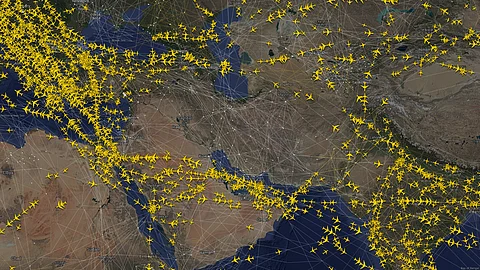
- Destinations
- Experiences
- Stay
- What's new
- Celebrating People
- Responsible Tourism
- CampaignsCampaigns
- SubscribeSubscribe
- Buy Now

At least 16 Air India flights on long-haul and ultra-long-haul routes were diverted on Friday (June 13) following Israel's military strikes on Iran and the subsequent closure of Iranian, Iraqi, and Jordanian airspace. The airline confirmed that flights from New York, London, Chicago, and Toronto were affected, with many diverted mid-air or forced to return to their points of origin.
The geopolitical escalation comes amid growing tensions in the Middle East. Israel launched an attack on Iran's capital, Tehran, targeting nuclear facilities, missile factories, and senior military commanders. The assault, described by Israeli authorities as the beginning of a prolonged operation, prompted emergency airspace closures across key aviation corridors.
Air India confirmed diversions and returns for several of its key international flights:
AI130 (London Heathrow–Mumbai): Diverted to Vienna
AI102 (New York–Delhi): Diverted to Sharjah
AI116 (New York–Mumbai): Diverted to Jeddah
AI2018 (London Heathrow–Delhi): Diverted to Mumbai
AI129 (Mumbai–London Heathrow): Returned to Mumbai
AI119 (Mumbai–New York): Returned to Mumbai
AI103 (Delhi–Washington): Returned to Delhi
AI106 (Newark–Delhi): Diverted to Vienna
AI188 (Vancouver–Delhi): Diverted to Jeddah
AI101 (Delhi–New York): Diverted to Frankfurt/Milan
AI126 (Chicago–Delhi): Diverted to Jeddah
AI132 (London Heathrow–Bengaluru): Diverted to Sharjah
AI2016 (London Heathrow–Delhi): Diverted to Vienna
AI104 (Washington–Delhi): Diverted to Vienna
AI190 (Toronto–Delhi): Diverted to Frankfurt
AI189 (Delhi–Toronto): Returned to Delhi
The airline stated on X (formerly Twitter) that passenger safety remains a top priority and that full refunds, complimentary rescheduling, and alternate flight arrangements are being offered to affected customers.
The disruption comes just a day after one of the worst aviation tragedies in India’s recent history. On June 12, Air India Flight AI-171, a Boeing 787 Dreamliner en route to London, crashed near Ahmedabad shortly after takeoff, killing 241 of the 242 people on board. The aircraft fell into the BJ Medical College hostel mess, injuring over 60 medical students and killing several on the ground. The lone survivor, Vishwas Kumar Ramesh, remains in critical care.
The incident has rattled the aviation industry and raised renewed questions about safety, aircraft maintenance, and crisis response. It also compounds logistical and reputational challenges for Air India at a time when geopolitical tensions are forcing massive mid-air route overhauls.
Following Israel's attack on Iran, Ben Gurion Airport in Tel Aviv was closed, and Israeli carriers suspended operations. El Al Airlines began relocating aircraft out of the country while Israir evacuated planes and halted services. Meanwhile, Iran closed its airspace, citing safety concerns, causing widespread disruption across international flight networks.
Iraq also suspended all air traffic, while Jordan closed its airspace hours after the attack began. As a result, airlines, including Emirates, Lufthansa, Qatar Airways, Turkish Airlines, and Flydubai, cancelled or rerouted multiple flights. Emirates diverted its Manchester-Dubai service to Istanbul; a Flydubai flight from Belgrade was rerouted to Yerevan.
With Pakistan's airspace already closed since early 2025 due to regional tensions, the new restrictions over Iran and its neighbours leave Indian carriers with extremely limited westbound corridors. Flights must now navigate longer routes over the Arabian Sea via Saudi Arabia, Egypt, or Central Asia, significantly increasing fuel burn, travel time, and operational complexity.
This double airspace closure is especially challenging for Air India, which operates multiple daily flights to Europe and North America. The airline now faces higher costs, tighter crew scheduling, and constrained airport slots, all during a high-demand summer travel season.
For passengers, these rerouted journeys come with longer travel times, more stopovers, and potentially higher ticket prices in the coming weeks. Airlines are absorbing immediate costs, but prolonged disruptions often lead to fare hikes to offset operational expenses. Delays and rebookings can also incur out-of-pocket costs for travellers, including missed connections, hotel stays, or last-mile transport changes—especially as global aviation continues to recover from other crises, such as the recent Ahmedabad crash.
(With inputs from PTI and other news reports)
